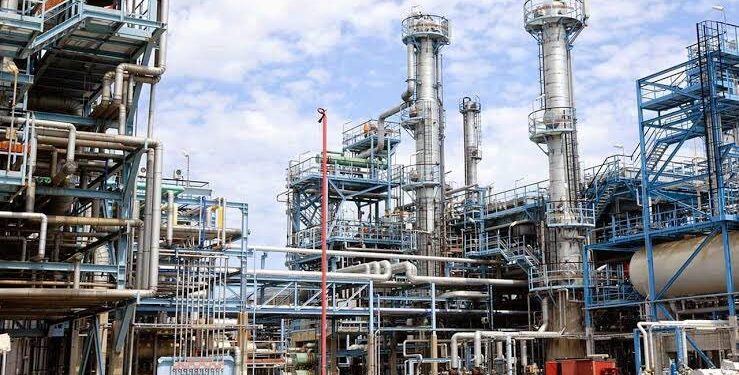The Energy Reforms Advocates of Nigeria (ERAN) has raised an alarm over an alleged plot by the Nigerian National Petroleum Company Limited (NNPCL) and a powerful cabal to sabotage the operations of the Dangote Refinery and other local refineries.
According to ERAN led by Daniel Clarke, the NNPCL plans to cut the supply of crude oil to the Dangote Refinery, a move that would force the facility to operate below capacity and undermine its ability to meet domestic demand.
This would lead to increased reliance on fuel imports, higher costs, and a return to the dreaded fuel queues.
At a press conference in Abuja, ERAN said that the corrupt cabal within the NNPCL is unsettled by the Dangote Refinery’s success, which threatens to expose their long-standing inefficiencies and corrupt practices.
The cabal allegedly aims to frustrate the refinery’s operations and portray it as unreliable.
The advocacy group praised the Dangote Refinery’s recent decision to lower fuel prices during the Yuletide season, describing it as a bold statement of its commitment to Nigerians.
“The recent news that NNPCL may cut crude oil supply to the Dangote Refinery and other local refineries is a cause for alarm. This decision, if implemented, would be patently unjustifiable and strategically detrimental to the refinery’s operational efficacy, thereby subverting Nigeria’s quest for energy self-sufficiency,” the statement said.
“This move appears to be a deliberate and orchestrated attempt to undermine the Dangote Refinery, which has been operating at full capacity, through a concerted and compound action.
“It Is particularly perplexing that this decision comes on the heels of reviving dormant refineries, which had been in a state of disrepair for an extended period, and were allegedly utilized as conduits for embezzling billions of naira without any meaningful efforts to resuscitate them.
“The sudden pronouncement that these refineries will soon become fully operational, followed by the surreptitious maneuvering to drastically curtail the allocation to the Dangote Refinery, raises pernicious concerns about the motivations underlying this decision.
“Evidently, the corrupt cabal within NNPCL is unsettled by their inability to dictate the prices at which Dangote Refinery sells its products. By reducing crude allocation, they aim to frustrate its operations and portray it as unreliable.
“Also, despite the production of AGO and Jet-A1 that exceeds the current daily consumption of petroleum products in Nigeria by the Dangote Refinery, against agreed terms, the Nigeria Midstream and Downstream Petroleum Regulatory Authority (NMDPRA) allegedly continued to issue import licenses to NNPCL, Matrix, and other companies for importing petroleum products such as Automotive Gas Oil (AGO) and Jet Fuel (aviation turbine fuel) into Nigeria.
“Nonetheless, it is worth noting that Dangote Refinery’s recent decision to lower fuel prices during the Yuletide season was a bold statement of its commitment to Nigerians- a strong love for the people in easing the economy burden and strain. This move, hailed by citizens nationwide, was perceived as an insult by the cabal who feared losing control over the narrative of fuel pricing.
“From record , it can be said that the gasoline bought from Dangote Refinery is actually cheaper and of good quality than the one they are importing, which begs the question as to why they aren’t supporting our indigenous production.
“However, It is patently clear that the opposition to Dangote Refinery’s endeavors stems from a deep-seated fear harbored by a powerful cabal, who dread being exposed for their long-standing inefficiencies and corrupt practices.
“The Dangote Refinery’s success would rate private refineries higher than state-owned ones, challenging the relevance of NNPCL’s operations and its long-standing inefficiencies, which would raise suspicion about the operation of the leadership in NNPCL.
“The Energy Reforms Advocates of Nigeria is very much convinced that this perceived threat has prompted the creation of a facade, wherein unrealistic expectations are being built around refineries that are yet to become fully operational.
“These refineries, which would essentially function as blending plants, are being allocated crude oil supplies, while the allocation for Dangote Refinery is being deliberately reduced. This is one which is ostensibly designed to frustrate Dangote Refinery’s operations and enable the cabal to regain control over Nigeria’s oil and gas sector, thereby perpetuating their corrupt practices.”
ERAN called on the federal government to take immediate action to prevent any reduction in crude allocation to the Dangote Refinery and other local refineries. The group also demanded that the NNPCL’s operations be subjected to independent audits to ensure accountability.











